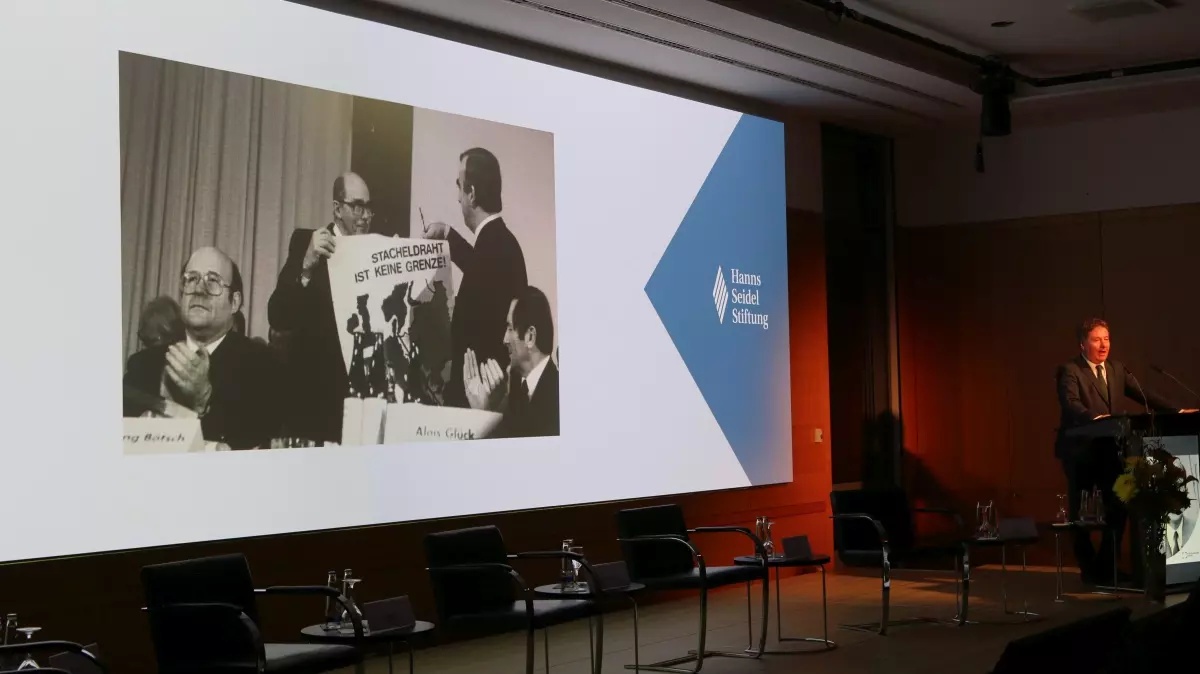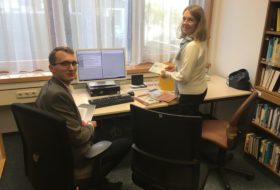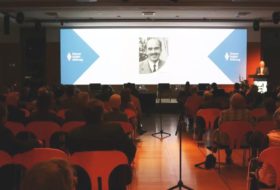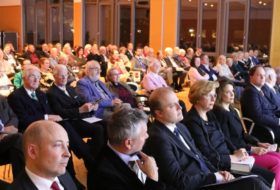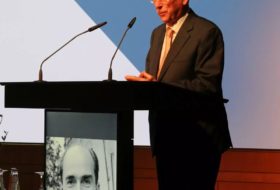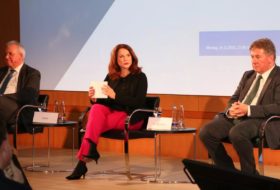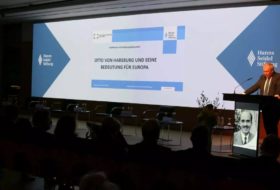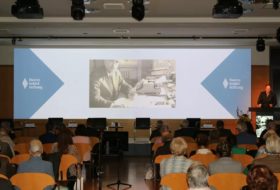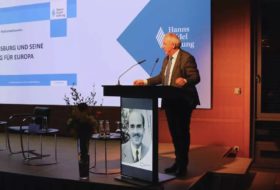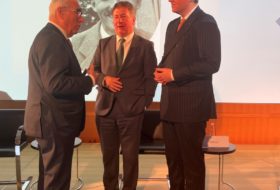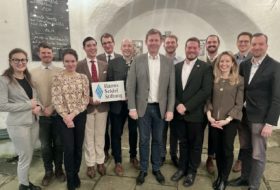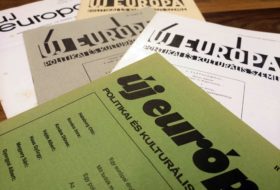The conference, held at the Bavarian Foundation’s Munich headquarters, aimed to present Otto von Habsburg’s work in Europe, highlighting some aspects of the former MEP’s rich intellectual legacy that may be relevant to today’s political thinking and action. The choice of venue was hardly a coincidence, as Otto von Habsburg served for four years as Chairman of the Foreign Policy Advisory Board of the Hanns Seidel Foundation and was elected to the European Parliament in 1979, where he served four terms as a delegate of the Christian Social Union in Bavaria (CSU).
The participants were welcomed by Markus Ferber, Member of the European Parliament and President of the Hanns Seidel Foundation. Praising Otto von Habsburg’s role in Europe, he stated that in these difficult times, it is crucial to return to the public ethos of the former Crown Prince, which can serve as a compass to help us deal effectively with the challenges ahead.
Gergely Prőhle thanked the organisers in Munich for embracing our initiative, so we can truly consider the intellectual legacy of Otto von Habsburg as a common heritage, and this will also strengthen Hungarian-German relations. The Director of our Foundation underlined that the real strength of Otto von Habsburg’s work and political charisma was his gratitude for all he was given in his career. His optimism and political awareness helped him to transform his legacy into the social and intellectual capital that would eventually make him one of the most significant Christian Democrat politicians of the second half of the last century. Gergely Prőhle concluded his introductory remarks by showing a photograph found in the Hanns Seidel Foundation archives on the morning of the event. The photo, taken in 1989, shows our namesake and the German speaker of the event, former Federal Finance Minister Theo Waigel.
In his exposé, Theo Waigel recalled the beginning of Otto von Habsburg’s party political career and how the Hanns Seidel Foundation and, later, the CSU bridged the gap between his dynastic past and heritage and his diplomatic and political engagement. As the representative of the oldest European dynasty, Otto von Habsburg had a unique career in European politics, not as a monarch but as a Member of the European Parliament. The politician stressed that his efforts for a united, free and sovereign Europe were undoubtedly one of the most important legacies of Otto von Habsburg’s work, as his former party colleague was one of the first to recognise that the key to peace on the continent lay in the European integration. Reflecting his dedication to a united Europe, the former Finance Minister said that Otto von Habsburg had been concerned about the transformations taking place in the wider Central European region since the 1980s and had sought to build as much political support as possible for the cause of the countries east of the Yalta line, clearly advocating the restoration of their right to autonomy and the subsequent European integration of the region. Otto von Habsburg was also a staunch supporter of Spain’s European accession for decades and was happy to facilitate similar efforts for Portugal. The former CSU politician stressed that for Otto von Habsburg, European unity was inconceivable without a conscious embrace of Christian foundations and values, which remain vital in an increasingly secular public life. The former heir to the throne’s commitment to public life and his political stance is illustrated by the fact that in his work at the European Parliament, he was as keen to deal with minor matters as he was to deal with major ones. Thus, for him, the negotiation of individual procedural rules was no less important than the discussion of global foreign policy and the critical issues of European affairs. Thanks to his historical consciousness and consequent foresight, Otto von Habsburg was one of the first to warn of the impending Soviet invasion of Afghanistan, and he was equally quick to point out the dangers of disintegration in war and humanitarian affairs when the Yugoslav federation collapsed. His public experience and political acumen also enabled him to recognise that the fight against right-wing extremism must not lose sight of the importance of curbing left-wing extremism.
Otto von Habsburg was one of the great visionaries of Europe, and the formation of a united Europe would have been unthinkable without him
– concluded the CSU representative.
Ernő Schaller-Baross, Member of the European Parliament, underlined that what made Otto von Habsburg remarkable as a politician and a political thinker was his historical experience and the conscious political action he took based on this knowledge. The speaker also said that the former MEP had a significant contribution to play in making Europe an integration that recognises national, regional and local sovereignties that stem from different historical experiences and applies the principle of subsidiarity to achieve the greater common good, as well as taking into account the context of social justice. Referring back to Theo Waigel’s presentation, the politician pointed out that Otto von Habsburg’s oeuvre also clearly shows that he did not imagine Europe as a mere political-legal construct but as an integration built on shared intellectual foundations. It is no coincidence, therefore, that throughout his public career, he advocated a more prominent representation of these values, emphasising the decisive role of Christianity in shaping European political, social, economic and intellectual architecture. Although he was instinctively attuned to the spirit of the times, he never dismissed the values that were most important to him: despite his openly conservative/Christian democratic views, Otto von Habsburg’s charisma was based partly on his ability to connect with those who disagreed with him. This quality proved a great asset in his political and broader public career. The Supervisory Board of our Foundation member also pointed out that in his political career, Otto von Habsburg paid particular attention to the countries that had formerly been part of the Habsburg Monarchy. From his youth, he followed the fate of the successor states closely and was disappointed to realise that the geopolitical realities of the new world order after the Second World War had torn a large part of Central Europe out of the European community to which it had belonged for centuries. Not surprisingly, Otto von Habsburg was actively involved in preparing the region’s (and indeed the wider area, including the Baltic States and Germany) regime changes (e.g. patronage of the Pan-European Picnic) and then in supporting their accession to the Euro-Atlantic. Highlighting the former heir to the throne’s merits in the context of eastern enlargement, the Commissioner emphasised that “when we talk about the founding fathers of the European Union, we mention Robert Schuman, Konrad Adenauer or Alcide de Gasperi, among others, but from a Central European perspective, Otto von Habsburg is arguably one of them.
A round table discussion followed the presentations, moderated by Susanne Hornberger of the Hanns Seidel Foundation, with Eva Demmerle, former head of office and press secretary of Otto von Habsburg, Stefan Haböck, member of the Austrian Pan-European Union Presidency, Markus Ferber and Gergely Prőhle sharing their thoughts and memories of Otto von Habsburg. Reflecting in part on the presentations, the participants pointed out that the true value of the former MEP’s work and the strength of his political charisma lay in his unparalleled preparedness, his excellent analytical skills and the accompanying foresight, his historical awareness and his strong moral convictions, as well as his inspiring personality.
In his closing remarks, Consul General Gábor Tordai-Lejkó noted that it is rare to find a politician of such great stature as Otto von Habsburg in Hungarian and Bavarian politics. His far-sighted political thinking and his broad intellectual horizon, as well as his human qualities, made his career quite exceptional. His insights and advice would still be sorely needed in the midst of today’s public debates.
Photo: Hanns-Seidel-Stiftung
